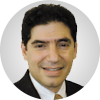I recently attended a conference at which Harvard Medical School's Don Levy, MD, was one of the speakers. Dr. Levy is the director of a multidisciplinary clinic that includes chiropractors.
I think the biopsychosocial model of a patient's problems is a dramatic improvement over the biomedical or disease model, and is consistent with chiropractic's approach of looking at the person with the problem and not just the problem. Levy suggested an evolutionary improvement in the model: that our job is reducing the patient's suffering.
Reducing suffering incorporates the biopsychosocial model, but simplifies it to its essence in a significant way. There are people who have severe pain and physical disability, but do not suffer (and as a result, probably don't seek care). In the book Tuesdays With Morrie, one can see that Morrie, a man with significant disability (amyotrophic lateral sclerosis) generally was not suffering. On the other hand, we've all had patients with very little pain or physical disability who are completely incapacitated by their suffering. Suffering people seek our aid in reducing their suffering.
Listening to Levy, he made me think of Dr. Stephen Covey's newest book, The 8th Habit. As a follow up to his Seven Habits of Highly Effective People, Covey writes that the eighth habit is: "Find your voice and inspire others to find theirs." Levy made me think that reducing a patient's suffering is a way that we chiropractors inspire others to find their voice. A person who is suffering can't express their voice. They are stuck dealing with, as in Maslow's Hierarchy of Needs, the second lowest need, safety (safety of health) and thus can't grow toward self-actualization. Beneficence is the ethical duty to bring about a positive outcome. Helping to remove suffering and thus helping the patient express their voice surely is an act of beneficence.
Duration of Care
A chiropractor with whom I was having an online discussion told me he thought that if there was evidence a particular method of treatment resulted in patients being treated effectively in a shorter rather than longer number of visits, applying this evidence to the patient was just working for the insurance company's benefit and not the patient. I disagree. I think more efficient care, helping the patient faster, is of benefit to the patient.
Economists call the expenditure of time or money opportunity costs. More efficient care might reduce the insurance companies expenditures (it might raise them by adding more expensive, but shorter treatment), but more efficient care must reduce the patient's opportunity costs. Also, helping the patient in a shorter period of time means they suffer less, and that obviously is a good thing. The greater the opportunity cost of our care, the less opportunity cost that can be applied to the patient's "voice." Thus, I can think of no ethical reason why more efficient care isn't better care for the patient.
I believe part of what has gotten some doctors to think shorter care is not beneficial for the patient is the business model many of us learned to practice. Practice management people have spread the idea that the only successful practice is one which sees a patient for many visits.
I once had a practice management consultant tell me I was a "bad doctor" because my average patient saw me for 12 visits, and this was all pre-managed care. He said a good doctor would have an average of at least 50 visits. Then he said, "Only those in practice for 30-40 years have PVAs [patient visit averages] that low. They don't care about the money." This rubbed me wrong in a few ways:
- Our job is to work for the patient's benefit and not our own. That is the nature of the social contract that created professions. Society turned over control of the professions to the professions because of society's relative ignorance of each profession's competency domain. This control was ceded to the professions as long as the professionals put the needs of the laity ahead of their own.
- I heard that an aphorism in traditional Oriental medicine is that the best acupuncturist is the one who uses the least needles, which sounded like less visits to me. There was even the concept that a doctor only got paid when the patient was well. Thus, it was in the doctor's financial best interests to help get the patient well quickly and keep them that way. Also, having been involved in sports medicine for a long time, I always thought my job was to help the patient get better as soon as possible.
- The word doctor comes from the Latin word docere − to teach. We should be teaching our patients how to keep themselves well, and empowering them to take responsibility and control of their own health, rather than creating dependency upon us.
Fear Avoidance
The evidence is good that those with fear avoidance beliefs are more likely to have chronic pain than those who do not exhibit this behavior. Fear of pain limits a person's mobility because they fear movement will not just cause pain, but also that the pain means they are harming themselves and making their condition worse. In reality, simply by not moving or moving less, the patient can progressively worsen their condition.
Fear also limits a person's expression of their "voice." Remember that Maslow's second level is safety, and fear is antithetical to safety. Educating patients about fear avoidance and the difference between hurt and harm empowers the patient to get past their fear avoidance beliefs. This gives them the opportunity to improve physically and to move out of Maslow's safety level.
Thus, helping the patient suffer less will help them express their voice (the 8th habit); another way to fulfill our duty of beneficence.
Click here for previous articles by Stephen M. Perle, DC, MS.





